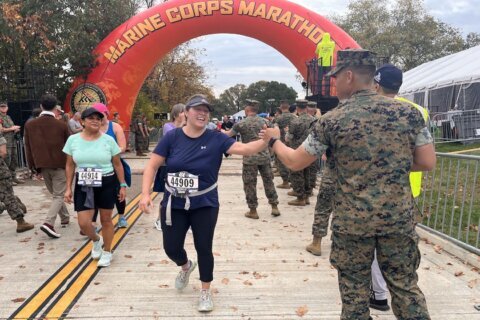
This month, WTOP is spotlighting participants in the 2019 Marine Corps Marathon events who are running with purpose and plan to finish with pride.
When Todd Gaddy, of Lutherville, Maryland, moved to the mid-Atlantic region about a decade ago, he was overweight and sedentary. But with time, he turned what began with slow walks outdoors into long distance runs — and eventually, marathons.
In fact, he had run 15 marathons by the time 2016 rolled around, and while he wasn’t running as fast as he felt he should have been, he kept going. Then, in April of 2016, he was diagnosed with a form of multiple sclerosis. Since then, he’s kept running anyway. When he runs the Marine Corps Marathon next weekend, he’ll be up to 21 marathons.
“I’m running the race to show myself and maybe some others that you can do more than you can, more than you think you can,” said Gaddy. “This is a way to push beyond that and help myself not be defined by that.”

Before, Gaddy ran for the physical and mental health benefits. He had lost weight and life was a little less stressful. In the weeks and months before his diagnosis, he now concedes something was a bit off, and that he was running at a slower pace than he had been before and didn’t know why.
Since the diagnosis, it makes a bit more sense to him, but at the same time, his doctors want him to keep running now.
“I’m trying to help what I can’t control not define who I am, but rather what I can control be the thing that I focus on,” said Gaddy.
MS affects people in a variety of different ways. Mobility and balance are among the more notable symptoms that can pose problems for people.
Luckily for Gaddy, that hasn’t been the case. Instead, it’s fatigue that’s been the worst thing he’s dealt with so far, and he admits he gets “more tired, more quickly.”
At the same time, Gaddy is confident running is keeping him going and living life with fewer MS symptoms than other people who develop the chronic illness.
“Certainly, emotionally, it helps me,” said Gaddy. “It’s a great way to help myself emotionally. Kind of a cathartic kind of experience to get out and run and not allow the stress to build up. It’s a great stress reliever for anyone generally speaking, illness or otherwise, but especially for some of the issues that I and others work through.”
“I’ve never gone out and run and regretted doing it,” he added.
Even if age and MS tag team against him over time, he defiantly said, “MS affects my pace but I can run farther than it.”
He knows that won’t be the case forever. Gaddy concedes that at a certain point he might be unable to keep running marathons. He’s not there yet, and he’s not worried about when he gets there either.
“I’m going to run until I can’t anymore,” said Gaddy. “And the fact of running helps me deal with the stress of whatever that may be.”
He has friends he runs with and keeps positive people around to keep mentally strong. He also has a wife and two daughters still in school, one in college and one in high school, who help him stay focused.
“They’re very supportive of me running,” said Gaddy. “They’re very excited [when they see me run] as am I when I see them.”
He also sees his fighting spirit in his daughters as they grow, even if they haven’t verbalized it.
“I’d like to think maybe a little bit of what I’m doing has an impact in that regard, and that’s exciting to see,” said Gaddy.
“Whatever it is, I encourage people to do hard things,” said Gaddy. “For me that’s running a marathon. That’s a difficult thing that not a lot of people do. So whatever your difficult thing is, that’s what I encourage people to do and get with others who help you stay accountable to that task.”
“Push yourself as much as you possibly can. Understand that there may be some limitations you have,” Gaddy added.
“Every step forward takes you closer to that goal.”








